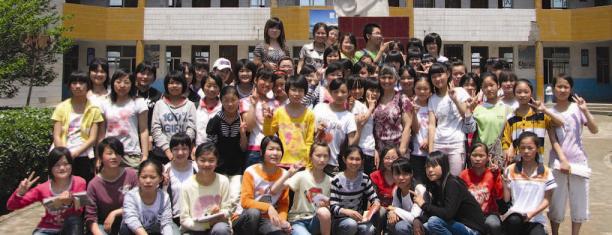 |
|
Shaw (2nd row) with some of her students |
Three years ago, a spiritual director asked Mistie Shaw (M.A. ’04) where she wanted to go. Her answer was literal and unequivocal: China.
So Shaw then turned her life around and got a job teaching English as a Second Language at Henan University of Science and Technology in Luoyang, a city of more than 3 million people in central China’s Henan Province. Just south of Luoyang is a world heritage site with 10,000 Buddhas carved into the hillside. And north of the city is a site containing the first Buddhist scriptures from India. Shaw describes her students as quite young socially. Most have never traveled, even within China. Materially, they are impoverished; at college she says they generally have three changes of clothes and they sleep on planks of plywood. The dormitories lack hot water, and the students must provide their own toilet paper, soap, and towels. Until a year ago, they lacked a student union, or any place to go to get out of the heat or cold to talk with one another. Not surprisingly, they do have cell phones and TVs (at home) and a great hunger for everything Western.
“I wanted to help the students learn more and have more,” Shaw says. With some help from friends — “I couldn’t have done it without them,” she says — Shaw came up with a solution: China Lifeline. Its mission is “to bring lasting improvement to the lives of China’s young people.” It sounds like a tall order. But in one year, Shaw and her friends (who now are members of China Lifeline’s Board of Directors) have created a student-run center called Sam’s Place, a clothing exchange, a program to assist students with obtaining prescriptions and eyewear at a reasonable cost, and a program called Helping Hands which encourages students to help others by volunteering as tutors, assisting in disaster relief, and otherwise serving their communities. Last summer, China Lifeline sponsored an intensive English language camp — volunteer graduate student teachers from Oklahoma City gave the Henan University students an immersion experience in conversational English. By the end of the camp, the Henan students wrote, produced, and acted in their own play in English. Shaw is looking forward to hearing from graduate students who may want to visit China next year to teach at the English Camp. (Interested? Email her.)
Shaw says simply that her work is “about loving people.” She would like to see a loose organization of people doing work similar to that of China Lifeline around the world. But at the present moment, she is content to teach English, see her students bloom and grow, and nurture their lifeline so they may become knowledgeable, responsible, compassionate leaders.
For more information about China Lifeline, visit: www.chinalifeline.org.
